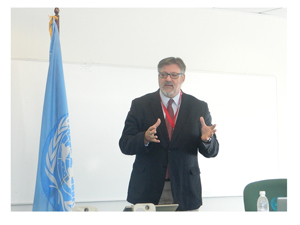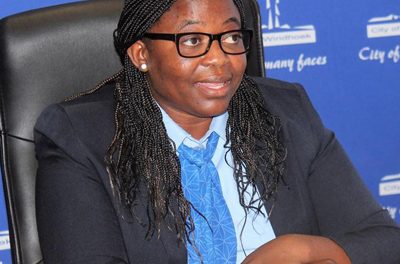
Project Coordinator of the Groundwater Resources Governance in Transboundary Aquifers: Stampriet Kalahari/Karoo Aquifer Project, Ivica Trumbic giving a presentation at the workshop. (Photograph by Melba Chipepo).
Having experienced one of the driest years that the country has had since 1998, it is obvious that water is indeed the most precious commodity that a country like Namibia can have. This week the Ministry of Agriculture, Water and Forestry and the United Nations Educational, Scientific and Cultural Organization (UNESCO) held a three-day workshop on the UNESCO-SDC (Swiss Agency for Development and Cooperation) project on the Stampriet-Kalahari/Karoo Aquifer. The workshop themed ‘Groundwater Resources Governance in Transboundary Aquifers: Stampriet Kalahari/Karoo Aquifer Case Study’s aim was to improve the scientific understanding of the Stampriet transboundary aquifer which is shared by Namibia, Botswana and South Africa.
The workshop aimed to improve capacity and education on groundwater and to discuss the details related to assessment of the project. Securing the availability of water resources and improving access to freshwater is high on the agenda of planners, politicians and the private sector. More than 98% of the planet’s fresh water is stored as groundwater in aquifers. It is estimated that groundwater provides about 50% of the current drinking water supply on a global scale. Speaking to the Economist, Project Coordinator Ivica Trumbic said the overall funding for the project is 2.5 million Swiss Francs (less than N$ 2 million) and that implementation of the project will take up to 2015. He said experts to teach the economical, environmental and hydrological aspects will be hired during and after the implementation of the project. Trumbic mentioned the lack of information as one of the problems that is faced by those involved in the project but hopes that the problem will be addressed by field workers who will work to bring more information on the project. Also speaking to the Economist, Director of Water Affairs of Botswana in the Ministry of Minerals, Energy and Water Resources, Dr O.T. Obakeng said the project will help Batswana understand the aquifer better in a broader way for them to be able to manage their resources. “We need to know the quotas on withdrawals so that we can manage the water. We need to know how much goes in, how much we want to get out of the aquifer as a country so that the aquifer resources can be sustained”. He said the water from the aquifer will be used for livestock and human consumption and that some of the villages near the aquifer will be get access to water via boreholes. Minister of Agriculture, Water and Forestry Hon. John Mutorwa urged water scientists to move faster in making hydrological research results publicly known as scientific research and investigations are not only done for pure research’s sake but must contribute to improve the lives of rural communities.













































